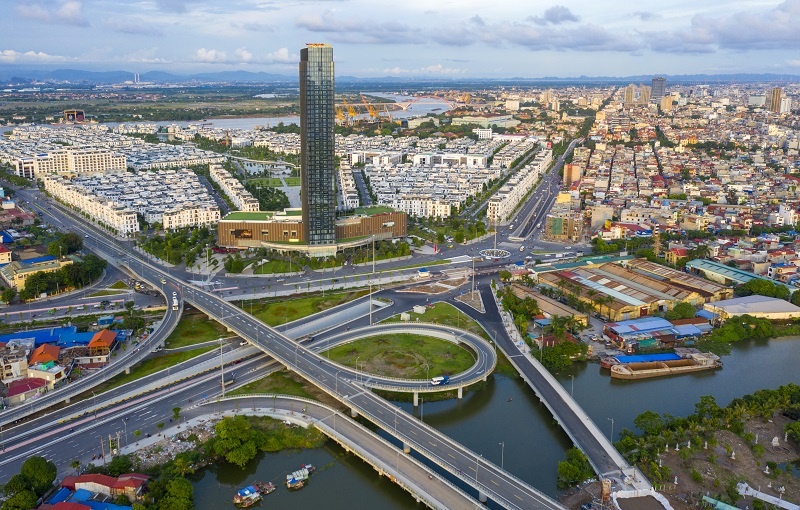INTERNATIONAL INVESTMENT
AND PORTAL
 Policy breakthroughs are expected to lift up Haiphong’s development
Policy breakthroughs are expected to lift up Haiphong’s development
At its recent second session, the 15th National Assembly approved a resolution on piloting some mechanisms and policies for the development of Haiphong and three other localities to promote sustainable development and create a model for other localities to follow.
Deputy head of the National Assembly’s Delegation of Haiphong City La Thanh Tan said that the resolution has received a high approval rate.
Haiphong’s geographical advantage as the main gateway to the northern sea, plays an important role in the economic growth of Vietnam.
Haiphong has witnessed high growth pace and achieved financial self-sufficiency, with ample space for further development. The city remained stable despite COVID-19, reporting one of the highest annual economic growth rates in the country. The resolution promises to boost development with spillover effects for the entire region.
The development directs pushing up the pace of modernisation and industrialisation in Haiphong, along with living standard improvementto be on par with leading Asian cities.
Leveraging incentive merchanisms in finance, salary policy, land planning and management, Haiphong is expected to accelerate socio-economic development in the forthcoming years.
Regarding financial and budgetary policies, Haiphong would mobilise capital through local government bond issuances, loans from domestic financial and non-financial organisations, and foreign loans taken up by the government to relend to the city. The total balance will be a maximum 60 per cent of the city's budgetary revenue. The city’s total annual loan and budget deficit shall be decided by the National Assembly in accordance with the Law on State Budget.
Annually, target-based budget supplementto the city from the central budget would not exceed 70 per cent of the central budget revenue increase. This allocation will be made unless the central budget suffers a deficit. This budgetary supplement will be determined on the basis of total gross revenue.
The Haiphong People's Council is also allowed to decide on the collection of fees and charges excluded from the List attached to the Law on Fees and Charges as well as adjust the rate of collection of the fees and charges included in the above list. This particular policy does not apply to court fees and charges.
The city budget will be able to keep all the increased revenue from adjusting fees and charges for socioeconomic infrastructure investment. This increase is not used to determine the distribution rate of central and local budget revenues.
The resolution clearly states that the pilot policy on fees and charges should follow a roadmap, creating a favourable business and production environment for enterprises, especially small- and medium-sized ones. Implementation will have to be consistent with market mechanisms and not disrupt goods circulation while ensuring transparency and promoting state administrative reforms.
Civil servants’ income will also be subject to a special mechanism. If Haiphong can ensure a stable budget for salary reform and social security policies for the whole period, the People's Council is allowed to use the residual salary reform budget to increase the average income for cadres, civil servants, and public employees according to their work performance. The extra income must not exceed 0.8 times the salary level by title and position. The income level of experts, scientists, and special professionals talents shall be regulated by the People's Council.
Regarding land management, the City People's Council is allowed to decide on changing the land use purpose of rice crop areas under 500 hectares, in accordance with the master planning and land use plans approved by competent authorities. These activities must be public, voted by the residents in question, and comply with relevant regulations. The change order and procedures shall be prescribed by the prime minister.
At the same time, based on the city's construction planning of functional and urban areas, the PM shall allow the city People's Committee to approve the adjustment of local general planning of functional and urban areas, ensuring the order and procedures regulated by the PM and report the results. This mechanism shall take effect from January 1, 2022 and would be implemented for five years.
At the meeting with voters in Hai An district this mid-November, National Assembly Chairman Vuong Dinh Hue said that the newly approved specific mechanisms and policies promise to boost Haiphong's development, becoming a driving force not only of the region but also for the whole country.
According to the NA Chairman, the Politburo has enacted two thematic resolutions related to Haiphong which reflect a big change in its status and development goals, not only serving as a growth pole but also acting as a motivating force to spur the development of whole region and the whole country.
The development directs pushing up the pace of modernisation and industrialisation in Haiphong, along with living standard improvementto be on par with leading Asian cities. Simultaneously, turning Haiphong into a leading city regionally and internationally.



















